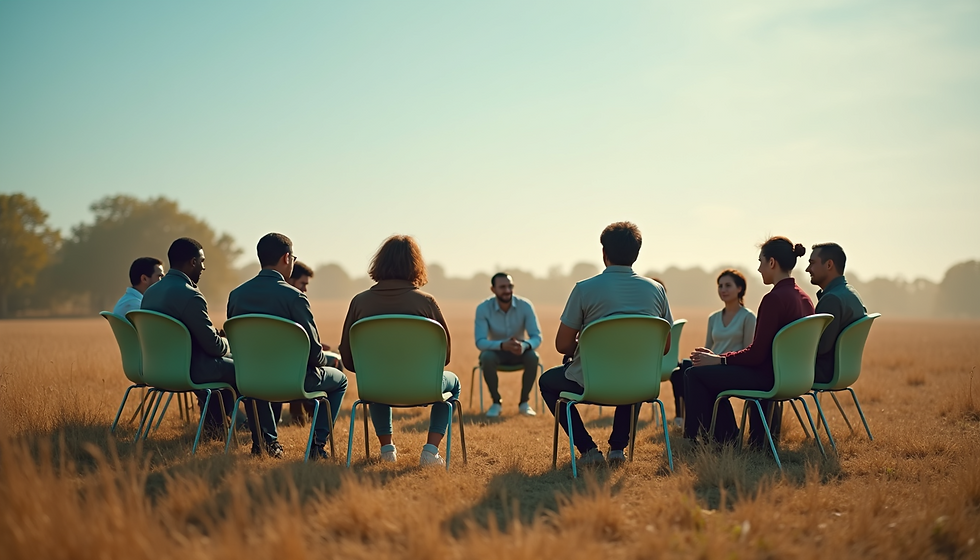Truth Over Dinner
- mvvasquez0811
- Jun 9, 2025
- 4 min read
Updated: Jul 15, 2025
My first assignment of the program started with asking individuals not in my cohort what is

the meaning of truth.
August 2024
When preparing myself to find individuals to discuss the meaning of truth, I intentionally sought friends and family I knew would be open to discussing and not debating on the subject. I decided to invite four friends and family members for dinner to discuss what truth means to them. I did not disclose the purpose of the dinner beforehand and decided dinner was the best way to ask questions all at once instead of individually. These individuals' professions ranged from automotive mechanic with an associate degree, automotive mechanic who is an army veteran, certified phlebotomist going to school for nursing, and medical billing coder who did not complete high school or obtain a GED. After dinner, I started the conversation by explaining to them the reason for inviting them over and the conversation I would like to have with them. At first, they were hesitant about the purpose of having the conversations until I told them it was for a class assignment after they became more open to communicating their thoughts on the subject. They joked that they felt honored to be a guinea pig.
When asked what the meaning of truth was to them, the mechanic with the associate degree said truth is facts. The phlebotomist said it was a medium of science and faith. The automotive mechanic who is an army veteran stated there is no truth, everyone has their own truth, and it could be completely wrong. The majority agreed with this statement. The medical billing coder stated the truth is whatever you believe it to be. When asked how they determine if someone is being true, the phlebotomist answers saying you do not know if someone is being truthful, it’s a mix of feeling and experience that can determine the truth. The mechanic stated having the correct information and investigating from experience can help determine if they understand the truth.
Regarding how we form ideas about what is true led to the discussion of how one obtains knowledge such as books, social media, and word of mouth. The discussion started with how true the theory of the earth is flat. The veteran stated encyclopedia in the past had mentioned Earth being in a dome and that there is no truth to landing on the moon if the dome theory is correct. I responded that throughout history data has changed as more research is done and the encyclopedias were revised to update the new findings. The veteran countered with who is to say the findings are true and not doctrine to make it untrue, to not upset the status quo? When war happens those who win determine what is true just like with the crusades burning anything that had nothing to do with Christ and wiping out other ideas and cultures. The mechanic interrupted the discussion to say our idea of truth is based on our thoughts dictated by our education, family, and willingness to find more information and not being ok with the bare minimum. The phlebotomist responded that society and individuals who had a hand in shaping our personality help us form our ideas about what is true. The individual who is in medical billing stated that their idea of truth comes from learning from what is not true based on those who were not truthful to them. They stated this makes them weary of others and makes it hard for them to trust people outside of those who have proven themselves to be truthful.
When asked how one understands other differences in truth and how they negotiated their reasoning, there was a mix of responses. The medical billing person said a person can be stubborn about the truth and will not want to hear any else unless they are ready to receive more information. The phlebotomist reported they usually agree to disagree and will not participate in a discussion as they find it difficult to be open to other opinions when they know their truths. The mechanic stated either you can pitch your side to change their mind, or you don’t. “I know what I know, and you know what you know and it’s all about perspective” The veteran responded that it depends on the importance of informing and what they believe to be true and if you are ready to have the last word and in the end “Sometimes ignorance is bliss”.
The reasoning for stating their profession was wanting to identify their thoughts on an education level since the assignment asked us to ask other individuals not in the doctoral program. Observing the differences in education vaguely changed their beliefs in what truth means to them. I learned that regardless of their education, background, and experience, these individuals had a greater understanding of what truth means to them. I could see how this conversation added to their perspective of truth and can see them adding it to their life experience, environment, social, and self-awareness.
This discussion brought out a memory of a client I worked with during my masters program. I questioned if clients were honest with me. After discussing my thoughts with my master's intern cohort and supervisor, I had a unique perspective of what is true according to the client. I found creating a therapeutic relationship helps the client determine whether it is safe to give truths. I was asked to imagine how much information I give to a stranger and how much I give to someone I have known for many years. This reminded me to keep an open mind because I do not know the clients lived experience.
What is the meaning of truth?



Comments